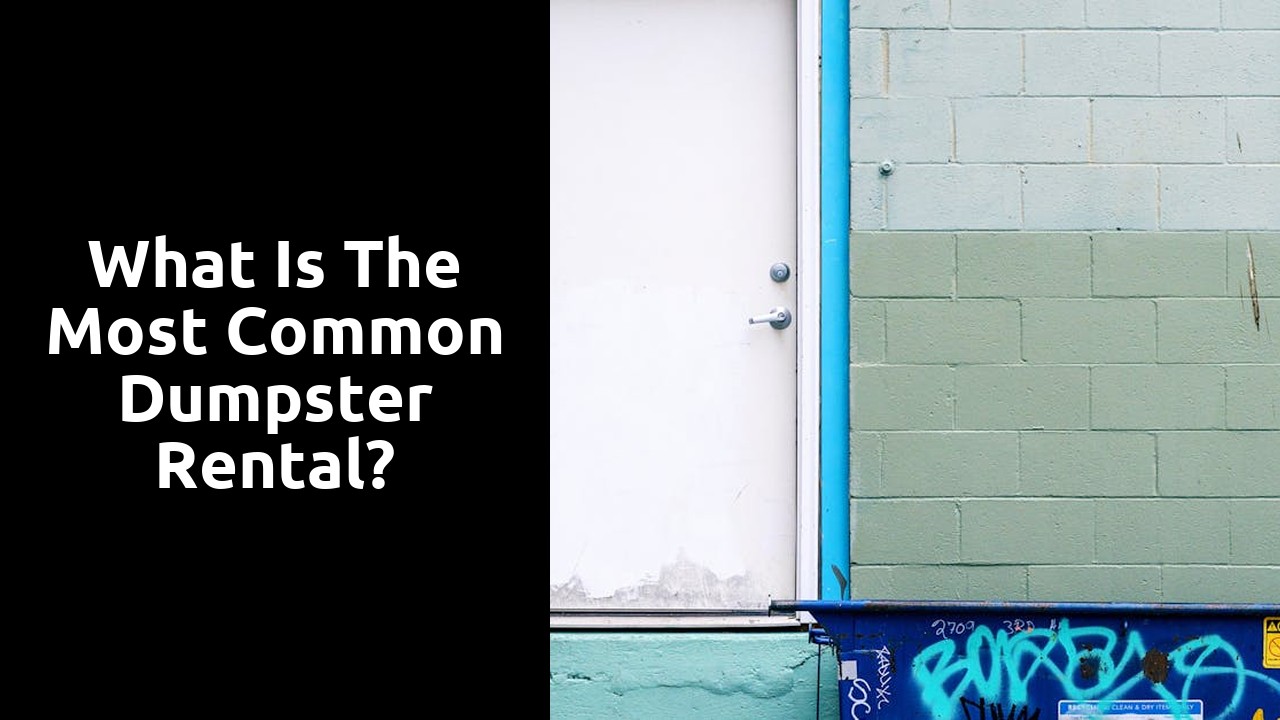What is the most common dumpster rental?

Table Of Contents
Choosing the Right Dumpster Size
Selecting the appropriate dumpster size is essential for any project. For smaller jobs, like spring cleaning or yard debris, a 10 or 15-yard dumpster often suffices. Larger projects, such as home renovations or commercial cleanouts, may require a 20, 30, or even 40-yard container. It's important to estimate the volume of waste accurately to avoid overfilling or underutilizing the space.
Before making a decision, consider the types of materials you plan to dispose of. Different sizes are designed for specific types of debris, such as concrete, mixed waste, or yard waste. Some rental companies provide guidelines to help determine the best fit for your needs. Taking the time to evaluate your requirements will streamline your project and ensure that the dumpster meets your disposal needs effectively.
Tips for Selection
When selecting a dumpster, consider the volume of waste you anticipate generating. Different projects, such as home renovations or large cleanouts, may require varying sizes. A 10-yard dumpster is suitable for small projects like garage cleanouts, while a 20-yard dumpster can accommodate larger jobs like roofing projects or extensive landscaping. Understanding the scope of your project will help you choose the right size to avoid additional costs associated with overflow or renting an additional dumpster.
Another factor to keep in mind is the type of materials you will be disposing of. Some dumpsters are designed for specific types of waste, such as yard debris, construction materials, or general household junk. Check with your rental company to ensure that the dumpster you choose aligns with your waste disposal needs. Additionally, be aware of any weight limits that might apply, as exceeding these can lead to extra charges or complications during pickup.
How to Rent a Dumpster
Renting a dumpster typically begins with assessing your waste disposal needs. This involves evaluating the amount and type of trash you expect to generate. Consider factors such as the project's size, the materials being discarded, and the timeline for completion. Gathering this information helps in selecting the appropriate size and type of dumpster for your specific requirements.
After determining your needs, the next step is identifying a reliable dumpster rental service. Research local providers and compare their offerings, including size options, rental duration, and pricing. Reading customer reviews can provide insights into their reliability and service quality. Once you've chosen a provider, contact them to discuss your needs, finalize the booking, and schedule a drop-off time that works for you.
The Booking Process
Renting a dumpster involves several straightforward steps. First, identify the appropriate size for your project. Consider your waste type and the amount you need to dispose of. Once you determine the size, search for local rental companies that offer options that fit your needs. Many businesses provide online platforms, making it easy to check availability and pricing.
After selecting a company, you can typically complete the reservation process online or via phone. Provide the necessary details, such as rental duration, drop-off location, and any special requirements. It is essential to confirm the pickup date and understand the total cost, including any potential fees. Watch for any specific instructions related to placing the dumpster on your property.
Local Regulations and Permits
Understanding local regulations is crucial when renting a dumpster. Different municipalities may enforce specific guidelines regarding dumpster placement, size limits, and duration of rental. Violating these regulations can lead to fines or delays in your project. Therefore, it's essential to check with local authorities or waste management services to ensure compliance with all applicable rules.
Permits may be required in certain areas for dumpster placement, especially on streets or public property. Obtaining these permits often necessitates a simple application process that includes your intended use and duration. Failure to secure the appropriate permits can result in immediate removal of the dumpster by local officials. It is advisable to start this process early to prevent unnecessary interruptions in your project timeline.
Understanding Compliance Requirements
Local regulations often dictate specific requirements for dumpster rentals, including placement, weight limits, and approved materials. Many municipalities have restrictions on what can be disposed of in a dumpster. The rules may vary significantly from one area to another, making it essential for renters to research their local guidelines before finalizing a rental.
Permits are frequently required for dumpsters placed on public streets or sidewalks. Obtaining a permit ensures compliance with local laws and helps avoid potential fines or penalties. Before scheduling a dumpster drop-off, confirm whether a permit is needed and understand the application process. Being aware of these requirements will facilitate a smoother rental experience.
FAQS
What size dumpster is most commonly rented?
The most commonly rented dumpster size is typically a 10-yard dumpster, which is ideal for smaller projects such as home cleanouts, renovations, or landscaping.
How do I determine what size dumpster I need?
To determine the right dumpster size, consider the amount of debris you need to dispose of, the type of materials, and the space available for the dumpster.
Are there any restrictions on what I can put in a dumpster?
Yes, most dumpster rental companies have restrictions on hazardous materials, electronics, tires, and certain appliances. It's important to check with your rental provider for specific guidelines.
How long can I keep a rented dumpster?
The rental period for a dumpster varies by company, but it typically ranges from a few days to a week. Extended rentals may be available for an additional fee.
Do I need a permit to rent a dumpster?
It depends on your local regulations and where you plan to place the dumpster. If it will be in a public right-of-way or on the street, you may need to obtain a permit. Always check with your local authorities.